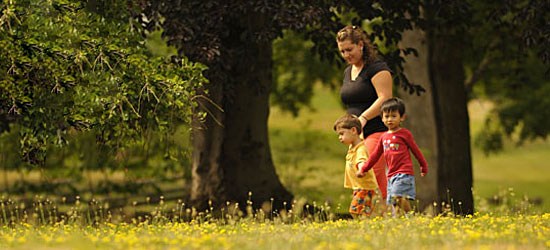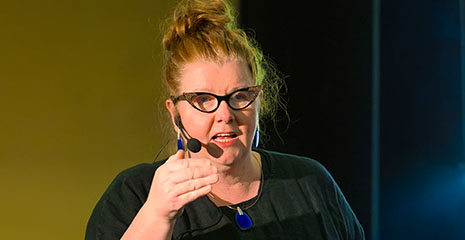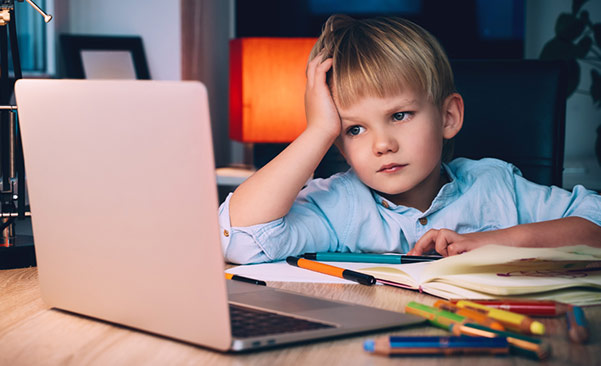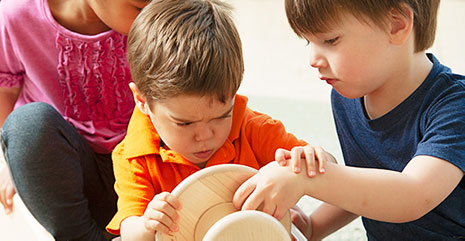Raising my kids without TV
| June 2012One day about two-and-a-half years ago I decided that my children weren't going to watch television anymore. Yes, you read that correctly. No more TV. At the time, I had no idea how staggering an effect this change would have on our lives. Today I know that it was one of the best decisions I've ever made, but it hasn't been easy.

It was on a November afternoon – peak season for holiday wish lists – I overheard my then 3-year-old daughter say, "I want that," about some piece of pink plastic that was being advertised on television. My overly-generous 5-year-old son turned to her and replied, "OK, you can have it." That was when I knew the commercials had to go.
So, I made the proclamation that there would be no more TV. "If you want to watch something," I said, "it has to be a video." Then came the arguments about which video to watch, and the proclamation changed to: "If you want to watch a video, you must choose one that you agree on." Pretty soon, the kids just stopped asking to watch altogether.
That's when I began to see the changes in our lifestyle. At first, they were subtle. My children began to play together more and fight less. Instead of acting out familiar movies or TV shows, they started creating stories of their own. My son had fewer tantrums. We lived through entire weekends with no TV – and didn't miss it.
Keep in mind, I was never a fanatic about this. If my kids were sick, or if the weather was terrible for days on end, we'd put in a video. And this winter, when the coldest weather hit, we rented a movie as a family, and my children thought that was the greatest treat we'd had in months.
Apparently, my anecdotal experiences with limited TV-viewing are supported by many childhood development experts, who agree that children should watch less television. One recent study conducted by Dr. Dimitri Christakis, a researcher at Children's Hospital and Regional Medical Center in Seattle, makes the case that the speed at which the images change on TV causes a child's brain to respond so quickly that children's brains are actually "re-wired" after prolonged exposure. As a result, Christakis reports, children who watch a great deal of TV are more likely to be diagnosed with attention disorders.
Of course, I didn't know any of this when I cut off the TV in my house. But the changes I've witnessed certainly support those research findings. So, too, do the comments of other parents (and the guy at the video store) who lament that today's children can't seem to sit through older movies because they move too slowly and don't hold a child's attention. Now that TV is a rare and special treat in my house, my children are fascinated by it. They can, and will, watch the oldest and slowest of children's movies, eyes aglow with wonder and awe.
Other benefits emerged, as well. My children aren't interested in fads the way they were when they saw TV commercials every afternoon. They're aware of what's out there – they hear about toys and food and fashion from friends – but they don't seem to care. Now, when they talk about something they want, I know they are motivated by something more substantial than a savvy marketing plan.
Most important, I feel like, in some small way, I am protecting my children. The evening news is not for children; breaking news is especially not for children. The trials and tribulations of the world will find them soon enough. For a little while – just a little while – I want them to be shielded from the very adult concepts of war, crime, hatred and sex. I can't keep the world at bay forever, but maybe we can make it through kindergarten and first grade.
I'd always been a vigilant TV mother. My kids watched mostly what could be described as "educational programming." Now I know that I'd used those programs as a parenting crutch. If I wanted to talk on the phone or read a book or cook dinner without the "help" of my children, the TV had occupied them.
When I unplugged the babysitter, I needed a new plan. The one I came up with was simple: Encourage old-fashioned play. That's right. Non-structured, super-messy, don't-read-the-instructions play. We didn't fill the time with lessons; we set up an art table with coloring books and reams of plain white paper. Now, imagination rules the roost.
My daughter lives in a princess world of pink. A world full of dolls and dress-up and adventures of her own making in which she is the smartest and most beautiful girl in the world. My son lives in LEGO-land, a smallish territory just across the border from skateboard country.
We make the backyard a jungle or an ocean or a volcano, complete with hose-powered waterfalls and mudpies. We paint and we glue. We make birdfeeders and catch bugs and dig for worms. And, yes, I do tons and tons of laundry.
I can't wait for the summer! I know that we will use more bug spray than every other family in my neighborhood – possibly put together – because we will be outside counting flowers, growing vegetables and watching to see how long it takes the ants to find the breadcrumbs. My house will be dirty, and my children will be messy. But we will be a closer, more active family for it.
I don't know if the no-TV rule would work for anyone else. But it works for us. I rest at night knowing that my children are making memories that don't have anything to do with whoever the popular cartoon character of the day is. And I rest at night knowing me and mine are just plain tired. And that's a good feeling to have.





